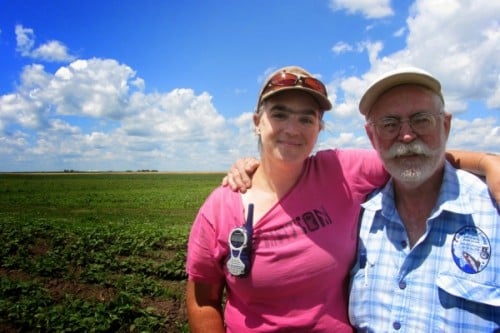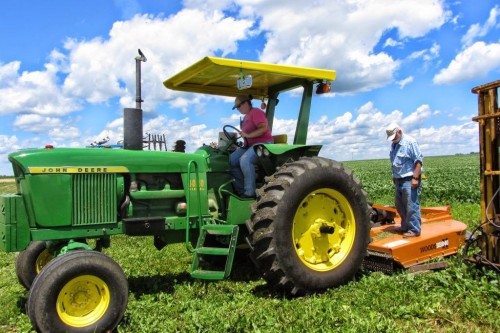 This is the 2nd profile in a 3-part series. Story and photos by Siena Chrisman.
This is the 2nd profile in a 3-part series. Story and photos by Siena Chrisman.
To reach Breslin Farms, you drive through what feels like a sea of corn. The northern Illinois land is vast and flat, subdivided by a grid of country roads that meet at perfectly right angles before continuing on due east and west, north and south. The corn fields stretch as far as the eye can see, interrupted only by soybean fields and the occasional grain storage bin. You know something is different about Breslin Farms on the approach—a dirt road turns onto a small bridge, and suddenly the plants are not corn but tall prairie grasses and saplings, the ground is hilly around a stream, and birds fly out of underbrush and wheel overhead. Continuing onto the farm, the fields are different too. There are still row crops like the surrounding corn and soybeans, but the plots are smaller and the plants more varied. Next to the equipment shed are a vegetable garden and a large test plot—unusual sights on an Illinois row crop farm.
Molly Breslin and her father John grow organic and heirloom beans and grains; an island in the middle of the sea of corn. Molly’s mother Peg’s family farmed for years; when John married Peg, he helped out her father and brothers on nights and weekends. Years later, he began volunteering on an organic vegetable farm, becoming valuable enough to be hired as a farm hand. Molly meanwhile headed to college at Berkeley, where she got involved in cooking in the student cooperative houses. After graduation, she led outdoor education trips with teenagers in northern Minnesota, and interned with an organic apple farmer and produce distributor. She wanted to do something “more essential to life,” she says, and something that would let her be outdoors, work hard and make a difference. Farming fit the bill.
 As it happened, there was land in the family. Peg had inherited almost 90 acres of her family’s farm, and agreed to let John and Molly try out their farming dreams on it. As John remembers it, Molly’s first question—”we’re going to do organic now, right?” —was obvious, if not easy or immediate, as the organic certification process takes three years. What to grow was more complicated. Beginning with nearly 90 acres of vegetables would have made a daunting project even more so, and there was already a thriving market in local produce. Their Farm Beginnings farm business and training class encouraged them to find and fill the gaps in their local food system; looking around at their local Chicago farmers’ market, they found there was no local flour. “And in terms of food security and sovereignty,” says John, “grains are really important.”
As it happened, there was land in the family. Peg had inherited almost 90 acres of her family’s farm, and agreed to let John and Molly try out their farming dreams on it. As John remembers it, Molly’s first question—”we’re going to do organic now, right?” —was obvious, if not easy or immediate, as the organic certification process takes three years. What to grow was more complicated. Beginning with nearly 90 acres of vegetables would have made a daunting project even more so, and there was already a thriving market in local produce. Their Farm Beginnings farm business and training class encouraged them to find and fill the gaps in their local food system; looking around at their local Chicago farmers’ market, they found there was no local flour. “And in terms of food security and sovereignty,” says John, “grains are really important.”
In 2010, Breslin Farms began, growing red winter wheat, heirloom beans, sweet corn, field corn and soybeans. They also keep bees, primarily for pollination, and experiment with fruit trees and vegetables. The farm received its organic certification in 2012, and they have found that the market for organic grains and beans is significant. The wheat is milled for Chicago restaurants; the seed company buys back the soybeans for seed; the corn goes into the organic commodity market where it is mostly sold for chicken feed; and the edible beans are sold directly to restaurants and to distributors in Chicago and St. Louis.
In line with organic standards, the farm is surrounded by 45-foot buffer zones, with a total of five acres of land between its crops and the herbicide-reliant corn around it. Just as important, it has engaged neighbors who appreciate what Molly and John are doing, and may even be willing to learn from it.
Continue reading on WhyHunger’s Digital StoryTelling Website.
About the Author Siena Chrisman has worked on sustainable food and farm issues for more than a decade. Her writing has appeared in Civil Eats, Modern Farmer and Grist, among other outlets. Formerly an organizer and writer with WhyHunger, where she was director of the online Food Security Learning Center and manager of the Connect Blog, her current freelance research and writing focuses on commodity farmers, livestock and farm policy. Siena was raised on raw milk in rural Massachusetts, and now lives in Brooklyn.


